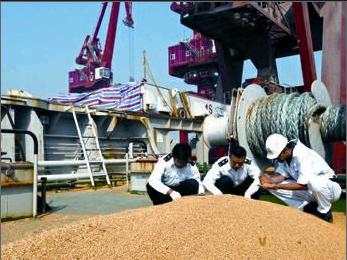Feeding the Future
2014-01-28Byyinpumin
By+yin+pumin

At the annual Central Economic Work Conference (CEWC), which was held in Beijing on December 10-13, Chinas leadership mapped out plans for the countrys economic work in 2014, listing national food security as a top priority.
“The country is facing the twin pressures of a decrease in arable land and growing food imports. The formulation of a new food security strategy is crucial,” said Dang Guoying, Director of the Office of Macroeconomic Research of the Rural Development Institute under the Chinese Academy of Social Sciences (CASS).
A statement issued after the meeting suggested that a national food security strategy based on strong domestic supply and moderate imports should be followed. Such a strategy will ensure Chinas production capacity while endorsing science and technology, according to the document, which also added that the country must focus on both the quality and quantity of agricultural products, the safety of foodstuffs, as well as supervision over production and the entire sales process.
“Ensuring there are sufficient supplies of safe and nutritious food is an important part of our national security strategy,” said Li Wei, Director of the Development Research Center of the State Council, Chinas cabinet.
According to him, the three major economic security concerns of todays world are food, energy and finance. “The new national food security strategy introduced by the CEWC is a timely response to the international trend,” Li said.
Domestic supplies
Strong domestic supply has always been stressed by the Chinese leadership as the best guarantee of food security. This years CEWC reiterated the principle, but, for the first time, it specified that the country should achieve basic self-sufficiency for major grains while also guar- anteeing the necessary quality and quantity of provisions.
According to the Medium- and Longterm Plan for National Food Security (2008-20) issued in 2008, the country should work to maintain a self-sufficiency rate of 95 percent.
In 2013, Chinas grain production hit 601.94 million tons, up 2.1 percent from 2012 and the 10th consecutive year of growth, according to data released by the National Bureau of Statistics last November.
“However, with increasing food imports, the hope for security brought by increasing grain yield has been dissolved,” said Zhang Yuanhong, another researcher with the CASS Rural Development Institute.
The General Administration of Customs reported that Chinas net imports of wheat, rice and corn amounted to 19 million tons in 2012. The number exceeded 11.43 million tons in the first seven months of last year. China is also likely to overtake Egypt to become the worlds largest wheat importer in 2013. The National Grain and Oils Information Center predicted that the countrys total imports of wheat would reach 6.5 million tons last year, compared to 3.68 million tons in 2012.
